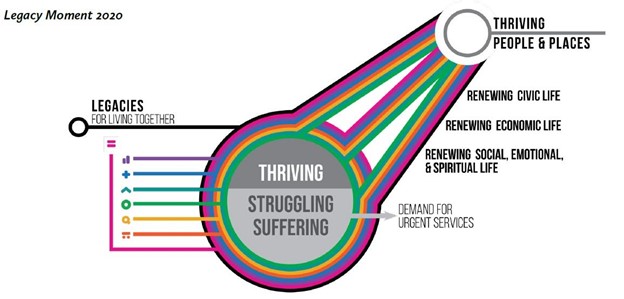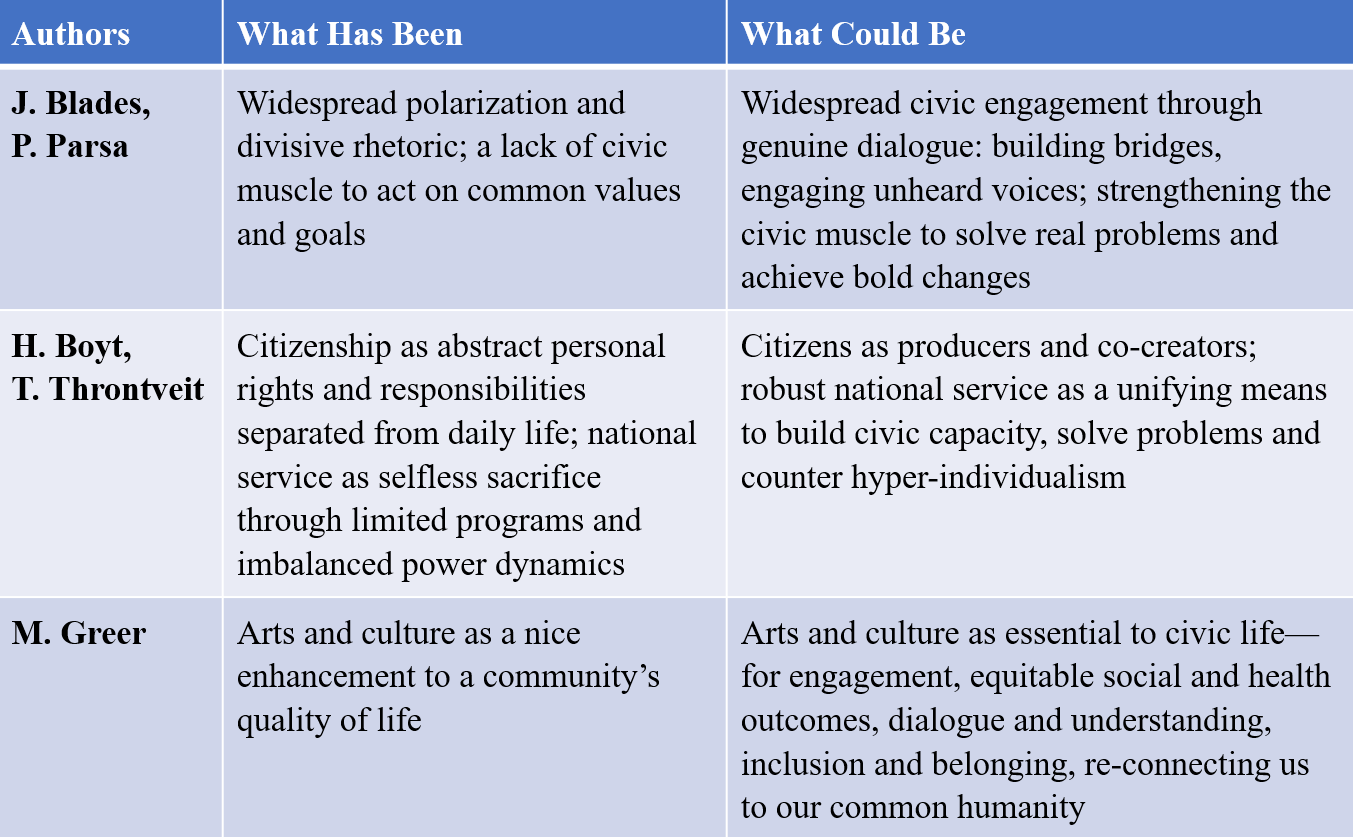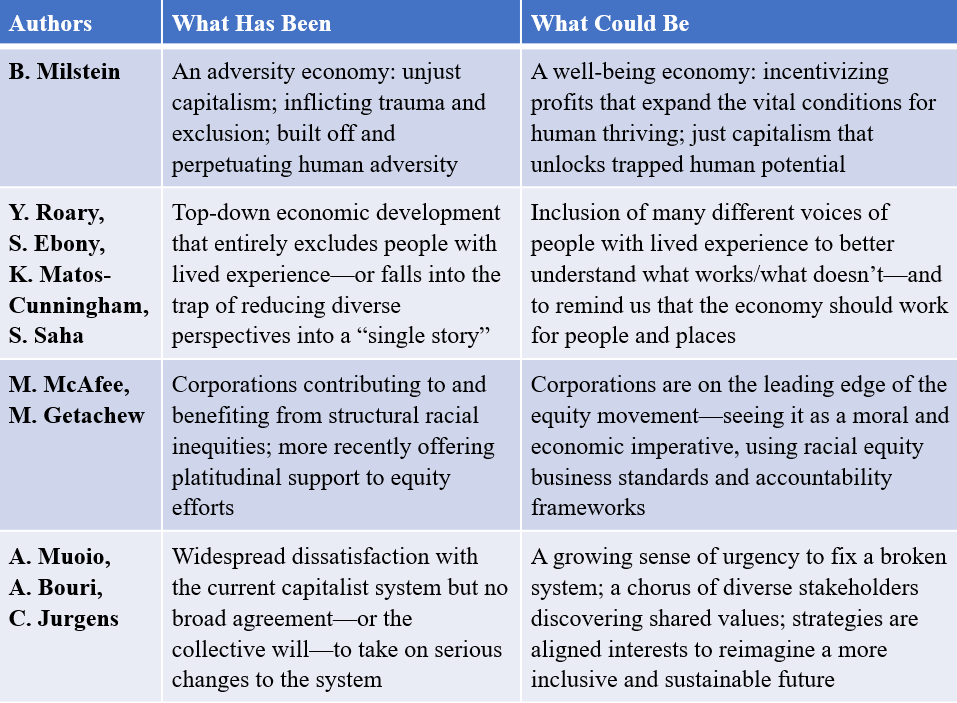By Monte Roulier
The planning of this special issue of the National Civic Review began months before the violent storming of the US Capitol on January 6, 2021. This failed insurrection underscores the profound crisis that has deeply affected individuals, groups, institutions and democratic norms within our nation.
Otto Scharmer astutely observed that, “as systems collapse, people rise.” This is the moment for everyone who cares about justice, peace, democracy—and who endeavors to love their neighbor (irrespective of differences)—to rise up and work in solidarity for renewal within our country. January 6th is a reminder that the stakes could not be higher, and that resistance to change will be formidable. The authors of this issue remind us that we are up for this test and that renewal is within our reach.
INTRODUCTION
Entering 2021, America finds itself in a liminal space: in between the once familiar and the unknown, between what has been and what could be. The compounding crises of 2020 have irrevocably changed our country—how we socialize, work, learn, use technology, consume media, confront racism, practice politics, and more. It has changed how we view each other and how we experience our immense interdependence. Although we may hold divergent views, most people in America agree that the speed of change and level of uncertainty is disorienting and disconcerting. At the same time, a collective, liminal space of this magnitude offers an unprecedented opportunity to discern and shape new ways of living—and thriving—together. This special issue of the National Civic Review is devoted to exploring emerging pathways for American renewal.
Springboard for Thriving Together
The pathways to renewal explored in this issue build upon a unique platform created amidst the crises of 2020: Thriving Together: A Springboard for Equitable Recovery and Resilience in Communities Across America. More than 100 people from leading non-governmental organizations and communities across the country collaborated to produce the “Springboard” as a resource to help American communities emerge from a tumultuous 2020 with greater resilience, equity, humanity, and direction. The Springboard is both holistic and pragmatic—designed to convert losses from failing systems into sustained, shared renewal. It is composed of:
- A single unifying and measurable expectation: All People and Places Thriving—No Exceptions;
- Pivotal moves to change course in the midst of crises by expanding the vital conditions for community and individual well-being; and
- Trend-bending ideas and provocative legacy questions organized around three Pathways for Renewal.

Long before the crises of 2020, life in America was out of balance. We have been consumed by an inhumane style of winner-take-all capitalism and by fight-to-the-death politics. This has effectively locked us into an exhausting loop: living-to-work vs. working-to-live, feeling socially short-changed, emotionally adrift, spiritually tested, and civically cynical. Furthermore, a pandemic that endangers our lives, halts the economy, and falls hardest on people of color, makes this maddening way of life unworkable. A super-majority of Americans agree that our entire system is spiraling out of control—and that we cannot go back.
The Springboard identified three promising paths for renewal—Civic Life, Economic Life, and Social, Emotional, and Spiritual Life. Early contributors to the Springboard made an initial pass at framing these highly interdependent forms of renewal. Now, six months later, the authors in this issue of the National Civic Review expand on these pathways to renewal: each sharing their piece of a portrait about how we move from What Has Been to What Could Be.
RENEWING CIVIC LIFE
BY WORKING ACROSS DIFFERENCES
Civic life is about living, learning and working together as shared stewards of our common world. It encompasses the infinite ways that people may connect and contribute to their community and society: from voting in an election or organizing a neighborhood arts festival, to standing up for a just cause or doing everyday work with pride in its public impacts and civic significance.
In this issue, the following authors offer their perspective on what it takes to renew civic life in communities across America.

RENEWING ECONOMIC LIFE
BY PURSUING SHARED, EQUITABLE PROSPERITY
Our economic life encompasses more than jobs, businesses, and financial institutions. It is an expression of what we value, who we value, and how we work together. It structures and channels our most basic transactions—and our most complex innovations. Our economic life holds tremendous possibility for unlocking trapped human potential, building wealth for working families, and sustaining the living ecosystems that support our existence.
In this issue, the following authors offer their perspective on what it takes to renew economic life in communities across America.

RENEWING SOCIAL, EMOTIONAL, & SPIRITUAL LIFE
BY GROWING RESILIENCE
Our social, emotional, and spiritual life ties directly to how we understand ourselves, relate to others, and experience belonging and purpose. It is about our thoughts, feelings, perceptions, connectedness, memories, and states of being. This sense of self and others is further shaped by factors that include the prevailing culture, our early life experience, our faith, and our ZIP codes. Our social, emotional, and spiritual life empowers our will, guides our decisions, influences our actions, and helps us know who we are.
In this issue, the following authors offer their perspectives on what it takes to renew social, emotional, and spiritual life in communities across America.

Enhancing Belonging & Countering Resistance
Threaded throughout this compilation—and key to understanding each path for renewal—are the questions: “Who belongs? And Who is being excluded?” The 2020 protests for racial justice evoked a long-overdue reckoning with ever-present legacies of exclusion and historic trauma directed toward people of color and Tribal Nations, as well as America’s unfulfilled promise of justice for all. The pandemic and its economic downturn also revealed just how far out of reach the fabled American Dream has become for white working-class families, the poor and young people.
A lack of belonging and the need to expand the circle of human concern is both an underlying problem and a key impetus for true renewal. As john powell, Executive Director of the Othering & Belonging Institute at UC Berkeley, suggests, belonging should be understood as more than simply access or inclusion. It is about partaking in the ongoing process of co-creation. It is at the heart of all renewal. Each of the authors has offered us a glimpse of what we could co-create together to unleash trapped human potential and to reconnect with our common humanity in the process.
While examples of what we might co-create provide much needed hope, we must also anticipate and counter active resistance to this type of renewal. We can expect to see an escalation in efforts to “other” and scapegoat people of color and immigrants, to spread conspiracy theories and falsehoods that threaten civil dialogue, and to put politics and profit over people and place. An environment of uncertainty, combined with the threat of scarcity, is the seedbed for these destructive forces. Resistance can also come in the form of the understandable cynicism about whether shared action on big ideas is even possible anymore in America.
How “We” Move Forward Matters
While American renewal is far from secure, it is within reach if we turn toward each other instead of against each other. Again, a super-majority of Americans is hungry for change. And a “we’re in this together” ethos offers the sustenance lacking in the narratives of division and “go-it-alone” individualism.
The many contributors to the Springboard arrived at five guiding principles for how we move forward together, without leaving anyone behind. In summation:
We succeed by adopting a unifying and measurable goal (all people and places thriving—no exceptions), by rejecting hierarchies of human value, by beginning with the wisdom and power rooted in people and place, by embracing and practicing shared stewardship, and by recognizing past legacies in order to secure new legacies for well-being and justice.
Gratitude and Invitation
I deeply appreciate all the authors in this special issue on renewal. Each article offers timely insight into an important aspect of renewal—and as a collection, they paint a portrait of a future filled with promise for everyone. Of course, the entire publication was made possible through our partners at the National Civic League—leading the way for community and civic renewal for more than 125 years.
Finally, this issue is best used as a conversation-starter rather than a definitive roadmap. As we enter the next decade, we invite you to become part of the movement for learning and co-creating a thriving future: turning toward each other through national and local dialogues, exploring resources for Thriving Together, and sharing your own ideas and stories of renewal. Take the next steps toward thriving together— sign up to stay connected and explore more at Thriving.us.
Here’s to 2021 and the next chapter in America’s story of Renewal!
Monte Roulier is President of Community Initiatives, Co-Founder of the Community Commons, and a member of the National Civic League Board of Directors.



